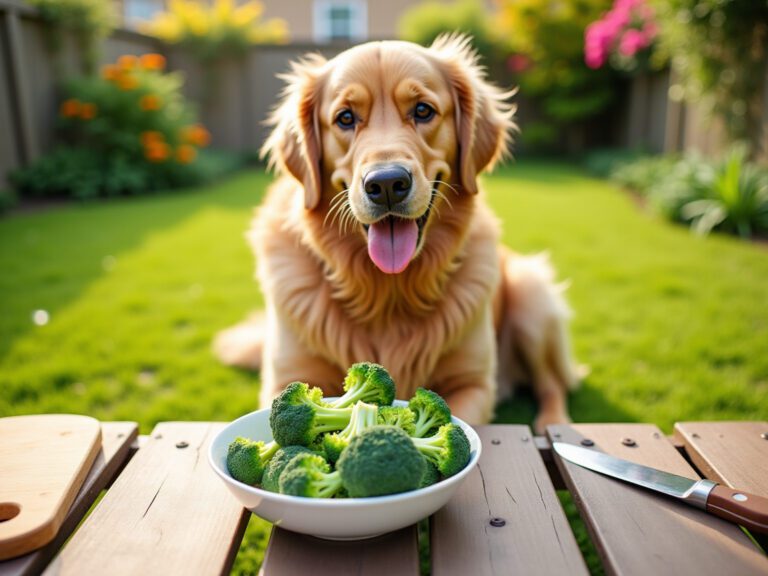7 Reasons Why Is Pork Good for Dogs’ Diets
Overview
Pork can be a wonderful addition to your furry family members’ diets. It offers high-quality protein, essential vitamins, and minerals that support muscle development and overall well-being. By highlighting pork’s excellent digestibility and nutrient density, we can see how, when prepared properly, it can enhance your dogs’ energy levels and vitality. Additionally, it serves as a less allergenic alternative to more common protein sources, addressing any concerns you may have about your pet’s dietary needs.
Imagine your beloved pet thriving with the right nutrition! At Adventure Den, we understand how important it is to provide a nurturing environment for your pets. When you choose pork, you are not just feeding them; you are investing in their health and happiness. Let’s ensure they receive the best care possible, filled with love and compassion.
Introduction
Pork has emerged as a compelling option for enhancing the diets of your furry family members, boasting a rich profile of essential nutrients that contribute to their overall health. As loving pet owners seek high-quality protein sources, understanding the benefits of incorporating pork into your dog’s meals becomes paramount.
However, with rising concerns about allergies and the safety of certain pork products, one must ponder: is pork truly a good choice for dogs? Exploring the nutritional advantages and safe feeding practices can illuminate whether this meat can be a valuable addition to your beloved pet’s diet.
Adventure Den: Premier Dog Daycare with Personalized Care and Safety
Adventure Den shines as Vancouver’s premier dog daycare facility, devoted to offering exceptional care for your furry family members. Understanding the importance of a secure and stimulating atmosphere, Adventure Den places the welfare and happiness of canines at the forefront. With the largest outdoor play space in the city, pets can exercise, socialize, and explore freely—essential for their physical and mental well-being. This nurturing environment ensures that every dog enjoys their time away from home, giving pet owners peace of mind.
Core offerings include:
- Dog daycare
- Dog boarding
- Cat boarding services
All designed to cater to the unique needs of each pet. Mindful supervision by a team of passionate dog lovers guarantees personalized care, striking a perfect balance between energetic play and peaceful rest. Advanced security measures, including 24/7 monitoring—similar to those at Camp Bow Wow facilities—and webcam access, allow pet owners to stay connected and reassured while watching their pets engage in joyful activities and make new friends.
Recent trends show a growing preference for dog daycare services, with 27% of pet owners utilizing daycare within the past year. This reflects a broader shift towards premium pet care, driven by increased pet ownership and consumer spending. Experts highlight the benefits of personalized care in dog daycare facilities, emphasizing that such environments promote socialization, training, and enrichment activities, which are vital for a dog’s overall well-being. As Rahul Pandita notes, “Pet daycare services provide supervised care, socialization, training, and enrichment activities for pets while their owners are away.” Adventure Den embodies these principles, making it a trusted choice for dog owners seeking a nurturing daycare experience.
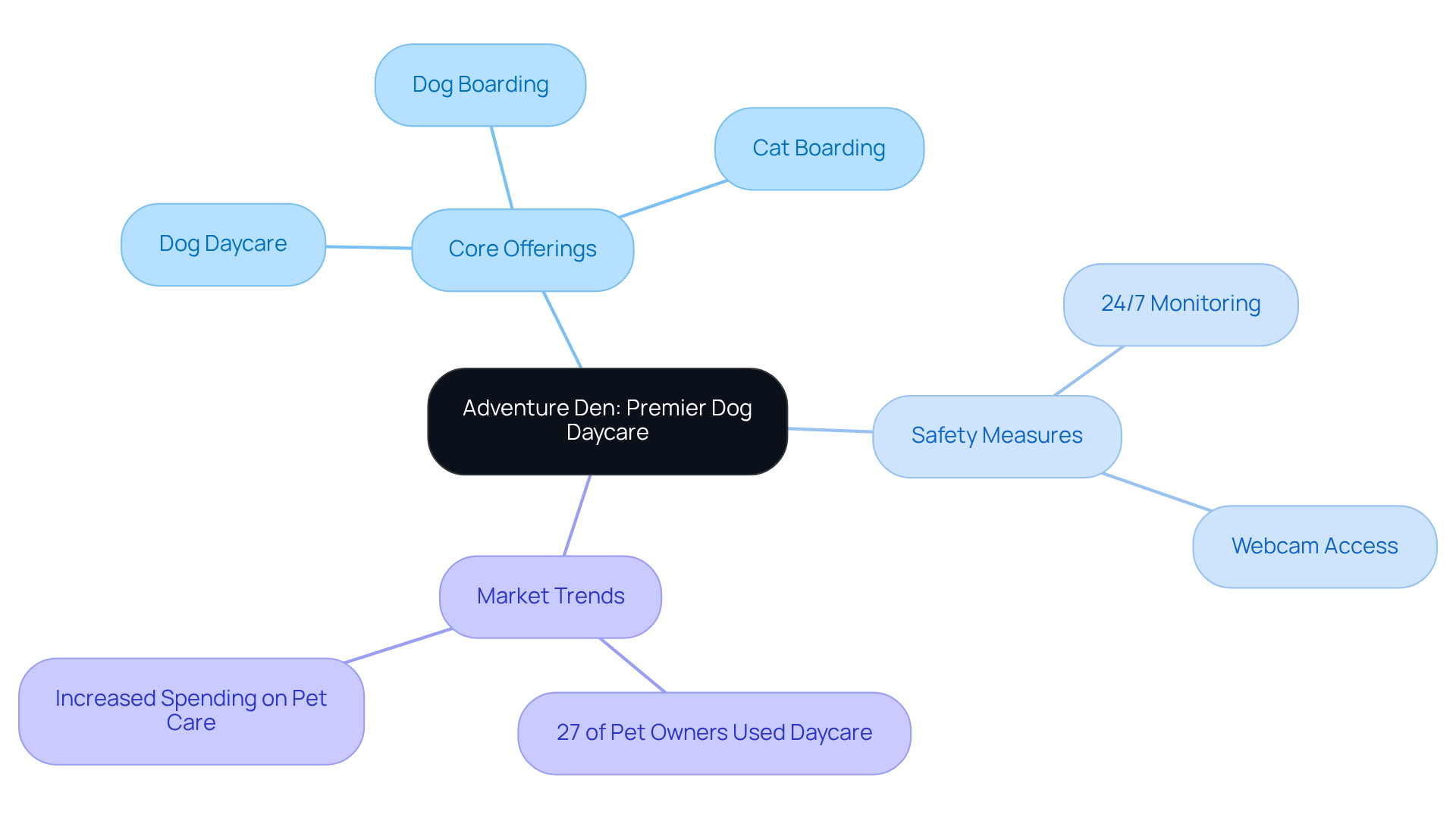
Pork as a High-Quality Protein Source for Dogs
The question of whether pork is good for dogs arises, as it stands out as a high-quality protein source for your furry family members, delivering a complete amino acid profile that is crucial for muscle development and overall well-being. Recent studies emphasize its outstanding digestibility, with meat usually being 85% to 95% digestible for canines. This makes it especially appropriate for those with sensitive stomachs. This digestibility not only aids in nutrient absorption but also contributes to improved energy levels and overall vitality. Moreover, pork is abundant in vital nutrients, such as B vitamins, iron, and zinc, which support various aspects of canine well-being, including energy metabolism and immune function.
Veterinarians frequently discuss whether pork is good for dogs as a less allergenic substitute compared to more common proteins like chicken, making it an ideal option for dogs with food sensitivities. For instance, Zignature’s Pork Formula is designed with limited ingredients to minimize potential triggers, promoting healthier stools and shinier coats. Including pork in your dog’s diet can diversify their protein sources, enhancing long-term health and well-being. It is important to note that this type of meat is not inherently toxic or dirtier than other meats, addressing common misconceptions about its safety. However, processed meat products like bacon and ham are unhealthy for dogs due to their high fat and sodium content. To ensure safety, it is crucial to source meat from reputable suppliers. Overall, when responsibly sourced and included in a balanced diet, the answer to the question ‘is pork good for dogs’ is that it can be a nutritious and beneficial addition to your dog’s meals.
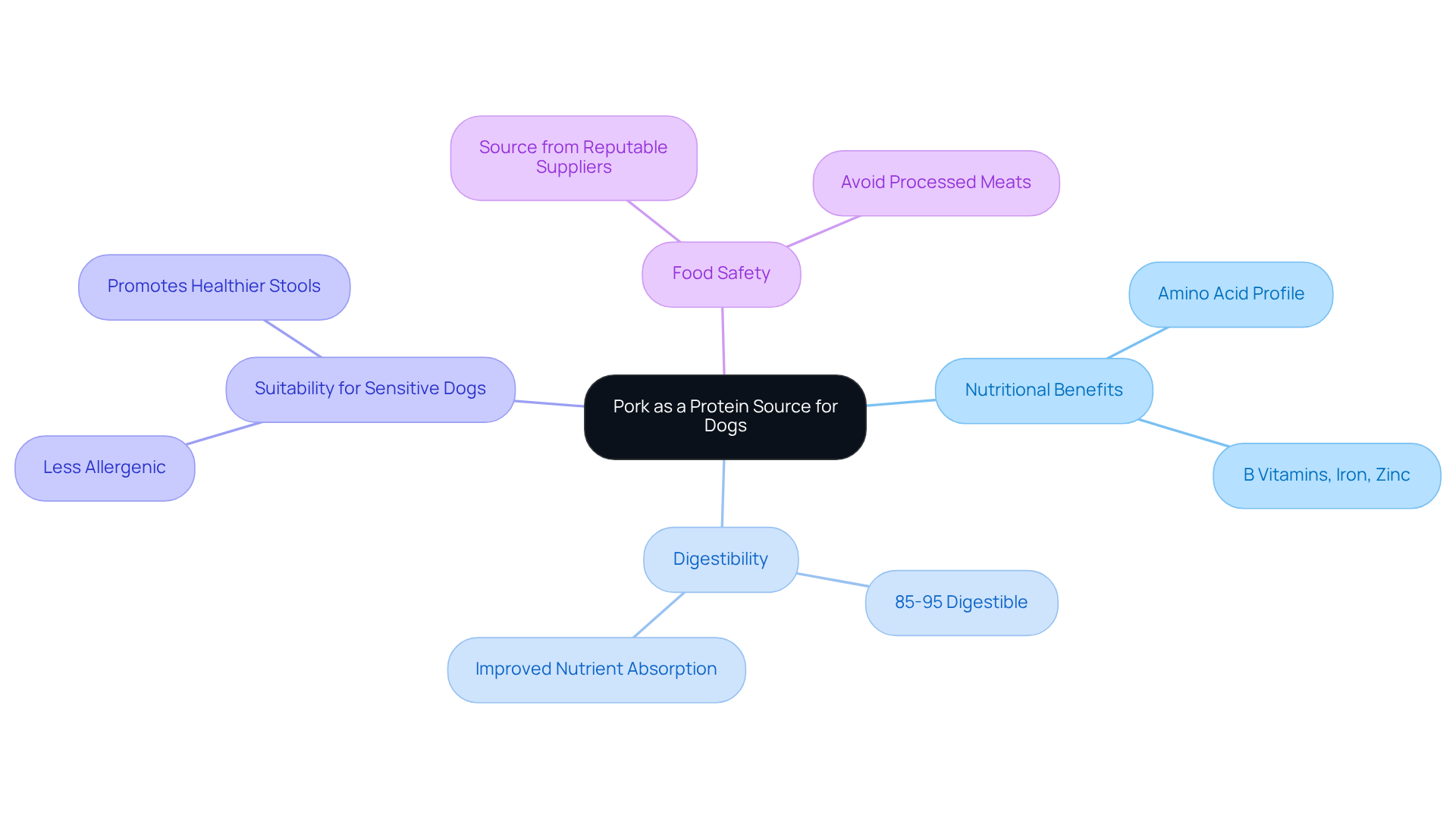
Nutritional Benefits: Vitamins and Minerals in Pork
Pork serves as a significant source of protein and is packed with vital vitamins and minerals that are essential for your furry family members. Notably, it is rich in B vitamins, such as B6 and B12, which play a crucial role in energy metabolism and neurological health. These vitamins support your dog’s energy levels and cognitive function, contributing to their overall vitality.
Moreover, this meat provides substantial amounts of zinc, which is essential for immune function, and selenium, a vital antioxidant that protects cells from oxidative stress. Together, these nutrients enhance your pet’s well-being, raising the question of whether pork is good for dogs when prepared properly.
Many high-quality dog food brands include pork for its rich vitamin content, ensuring that your pets receive a balanced intake of these essential nutrients. However, it’s important to prepare the meat thoroughly and avoid any seasonings, as certain ingredients can be harmful to pets. Additionally, be cautious of feeding fatty cuts of pork, which may lead to pancreatitis, and never give your dogs cooked bones, as they can splinter and cause serious injuries.
To ensure the safety and appropriateness of adding pork to your dog’s diet, it is highly recommended to consult with a veterinarian regarding whether pork is good for dogs. Your pet deserves the best care, and we at Adventure Den are here to support you in providing a nurturing environment for your beloved companions.
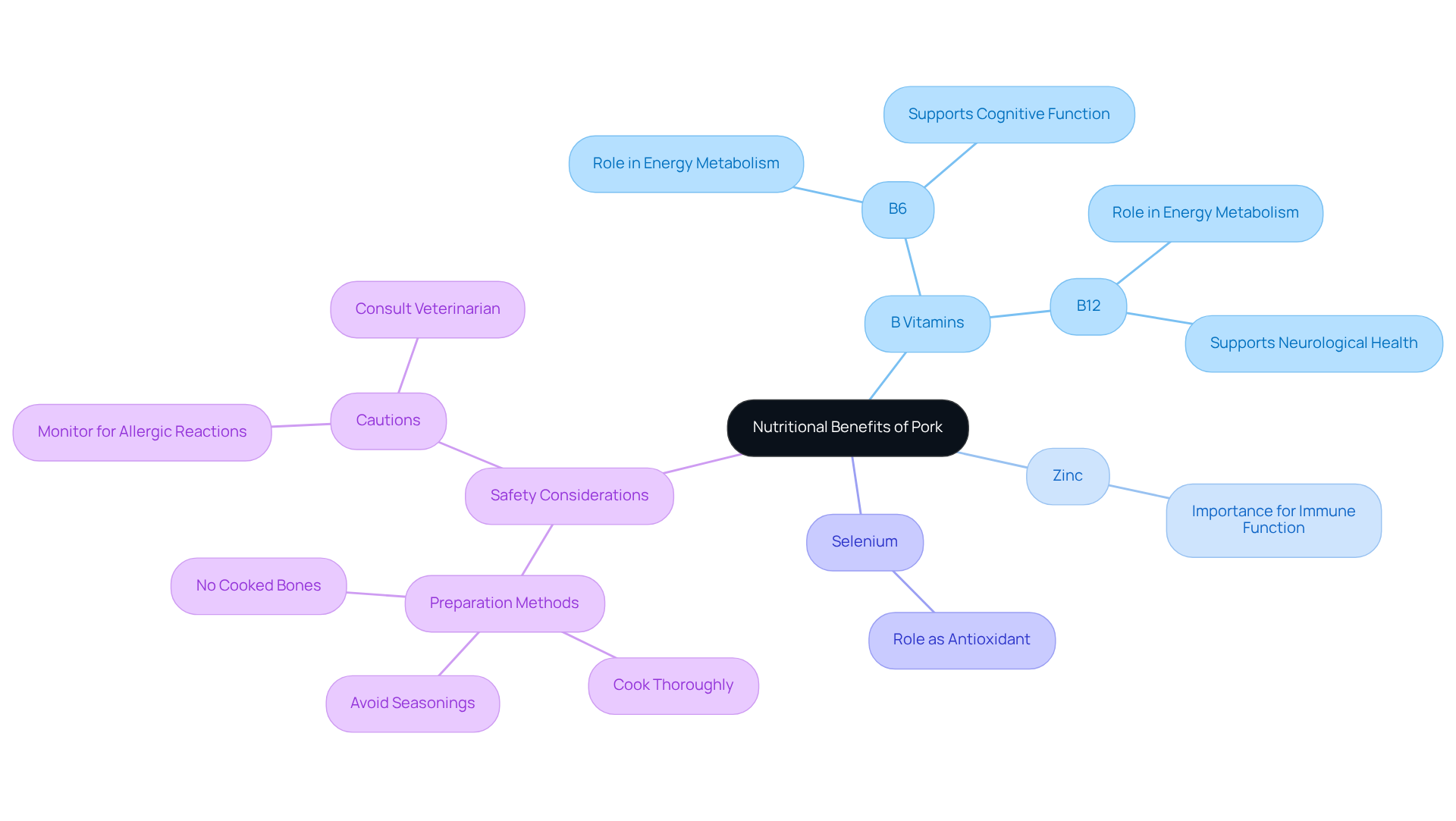
Easily Digestible: How Pork Supports Canine Digestion
Pork is truly celebrated for its high digestibility, making it an ideal protein source for your furry family members, leading to the consideration of whether pork is good for dogs, particularly for those with sensitive stomachs. The protein found in pork is easily broken down and absorbed, significantly reducing the risk of digestive upset. Moreover, the fat content in pork serves as a valuable energy source without overwhelming your dog’s digestive system, ensuring a balanced option for meals or treats.
Many veterinarians advocate for the use of easily digestible proteins, noting how they can enhance nutrient absorption and overall well-being in canines. For instance, dogs with sensitive stomachs often thrive on pork-based meals, leading to the inquiry of whether pork is good for dogs, as it demonstrates improved digestion and vitality. This not only makes pork a nutritious option but also leads to the consideration of whether pork is good for dogs, particularly for pet owners who aim to support their dog’s digestive health.
By choosing pork, you are nurturing your pet’s well-being and ensuring they receive the care they deserve. Consider incorporating this wholesome protein into your dog’s diet for a happier, healthier life.
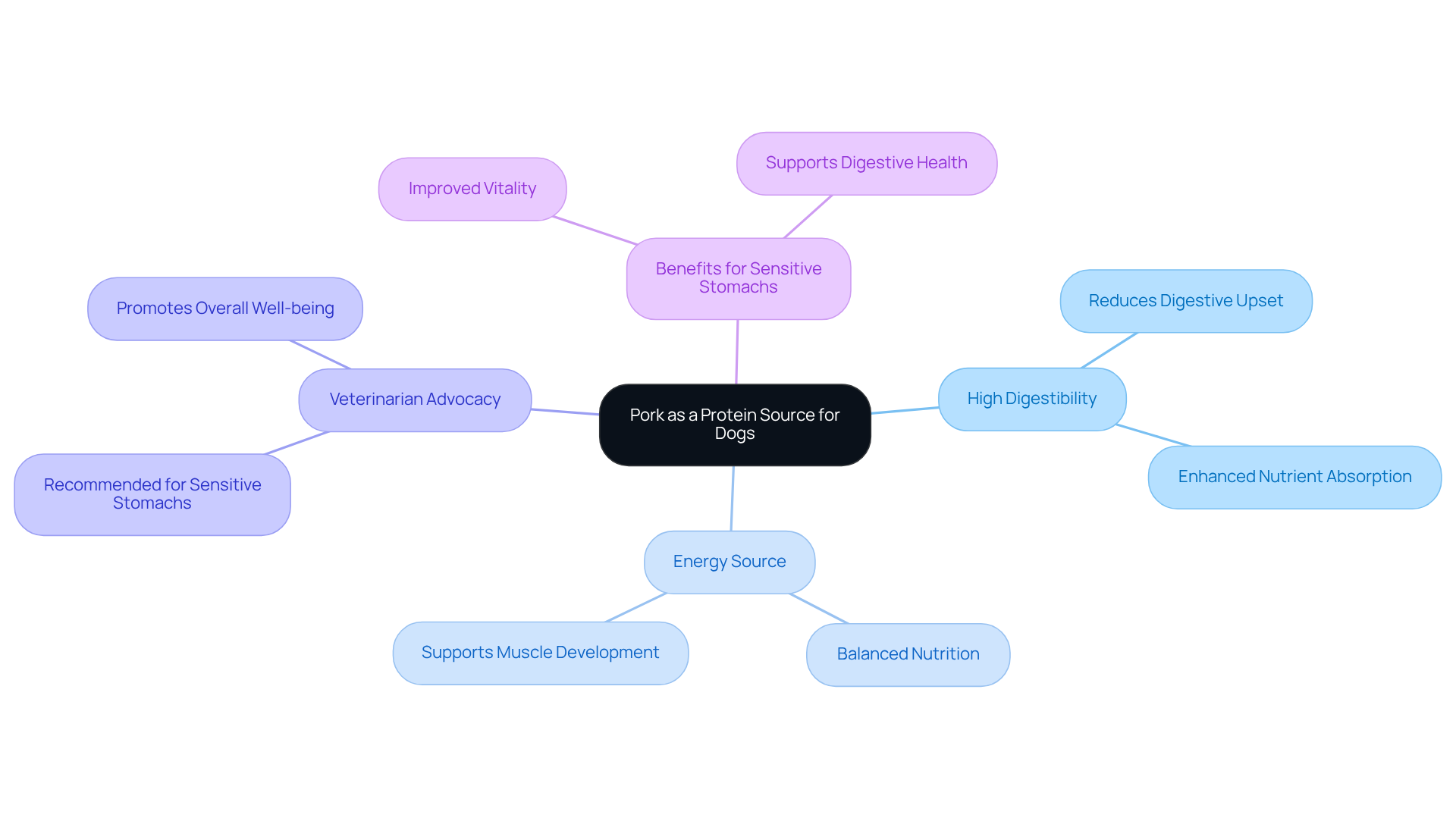
Safe Feeding Practices: Moderation and Preparation of Pork for Dogs
Incorporating meat into your furry family member’s diet requires thoughtful consideration and moderation. Start by serving only plain, cooked meat, ensuring it is free from any seasoning, sauces, or additives that might be harmful. It’s best to avoid processed meat products, such as bacon and sausages, due to their high fat and sodium content, which can pose health risks to dogs. Food safety guidelines recommend cooking meat to an internal temperature of 145°F to eliminate potential parasites and bacteria. Always prepare the meat thoroughly to ensure safety.
Begin with small portions to observe your dog’s reaction before regularly incorporating it into their meals. This cautious approach not only helps preserve your dog’s health but also allows them to enjoy the benefits of meat. Remember, practicing cleanliness is vital—wash your hands thoroughly after handling raw meat to prevent any risk of foodborne illness. By taking these steps, you create a nurturing environment for your beloved pet, ensuring they thrive and feel their best.
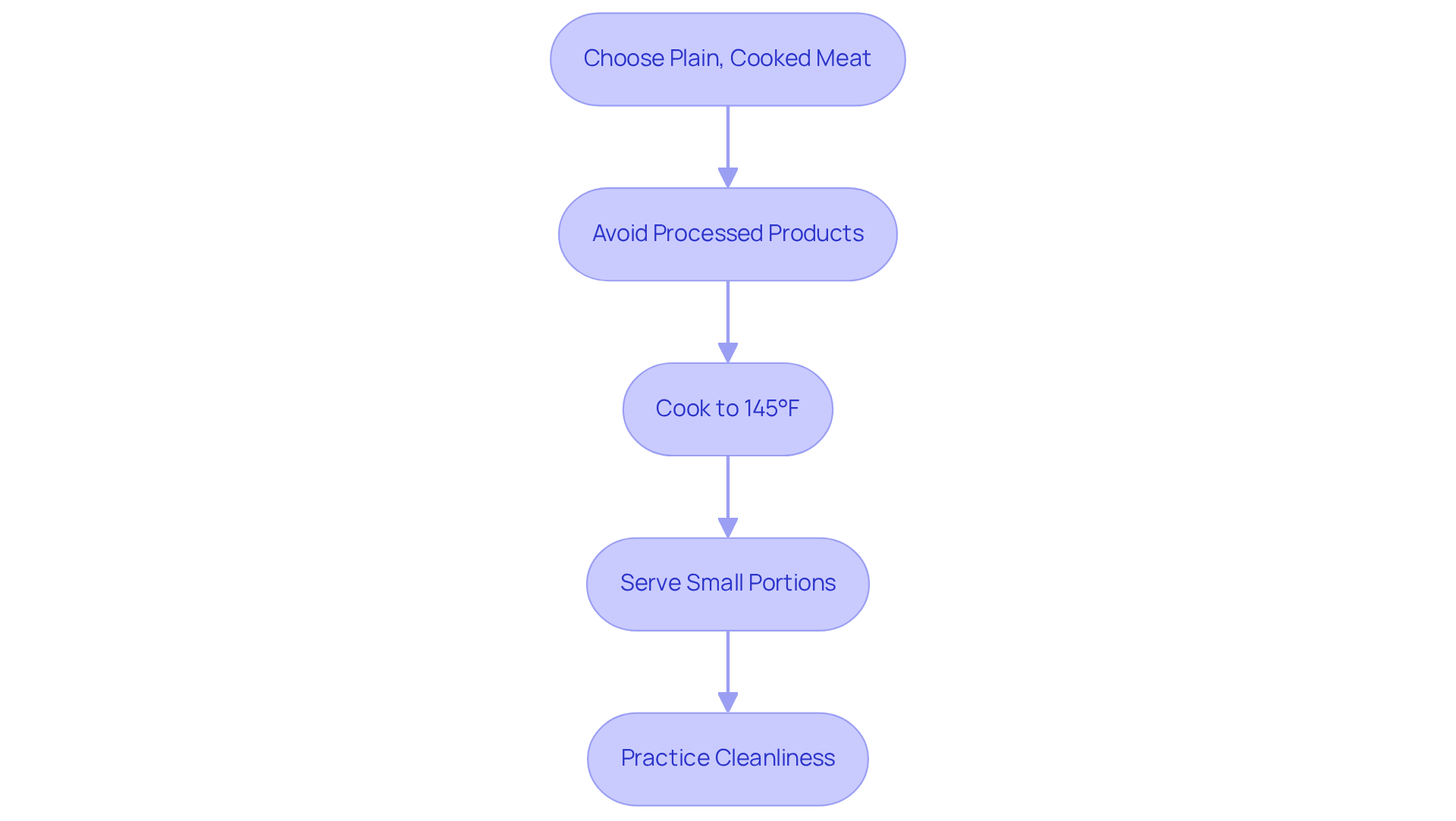
Alternative Pork Products: Sausages, Bacon, and More for Dogs
While plain pork can be a beneficial addition to your furry family member’s diet, many pet owners often ask, is pork good for dogs, as alternative pork products like pork liver also offer wonderful nutritional advantages. Rich in essential vitamins and minerals, pork liver serves as a nutrient-dense treat when given in moderation, making it a delightful choice for your beloved pet.
However, it’s important to be cautious with processed products like bacon and sausages. These items present considerable risks due to their high fat, salt, and preservative content. Regular consumption of such treats can lead to serious health conditions like pancreatitis and obesity. Did you know that a study found consuming just 5 ounces of processed meat a week can elevate the risk of heart disease in canines? This is why pet nutritionists emphasize the importance of opting for unseasoned, minimally processed options, including the question of whether is pork good for dogs, to ensure your dog’s health and well-being.
Furthermore, it’s crucial to remember that uncooked pig meat may harbor trichinella parasites, which can pose additional dangers. To keep your furry friend safe, it’s best to refrain from giving uncooked pig meat to canines. By choosing wisely, you can create a nurturing environment that supports your pet’s health and happiness.
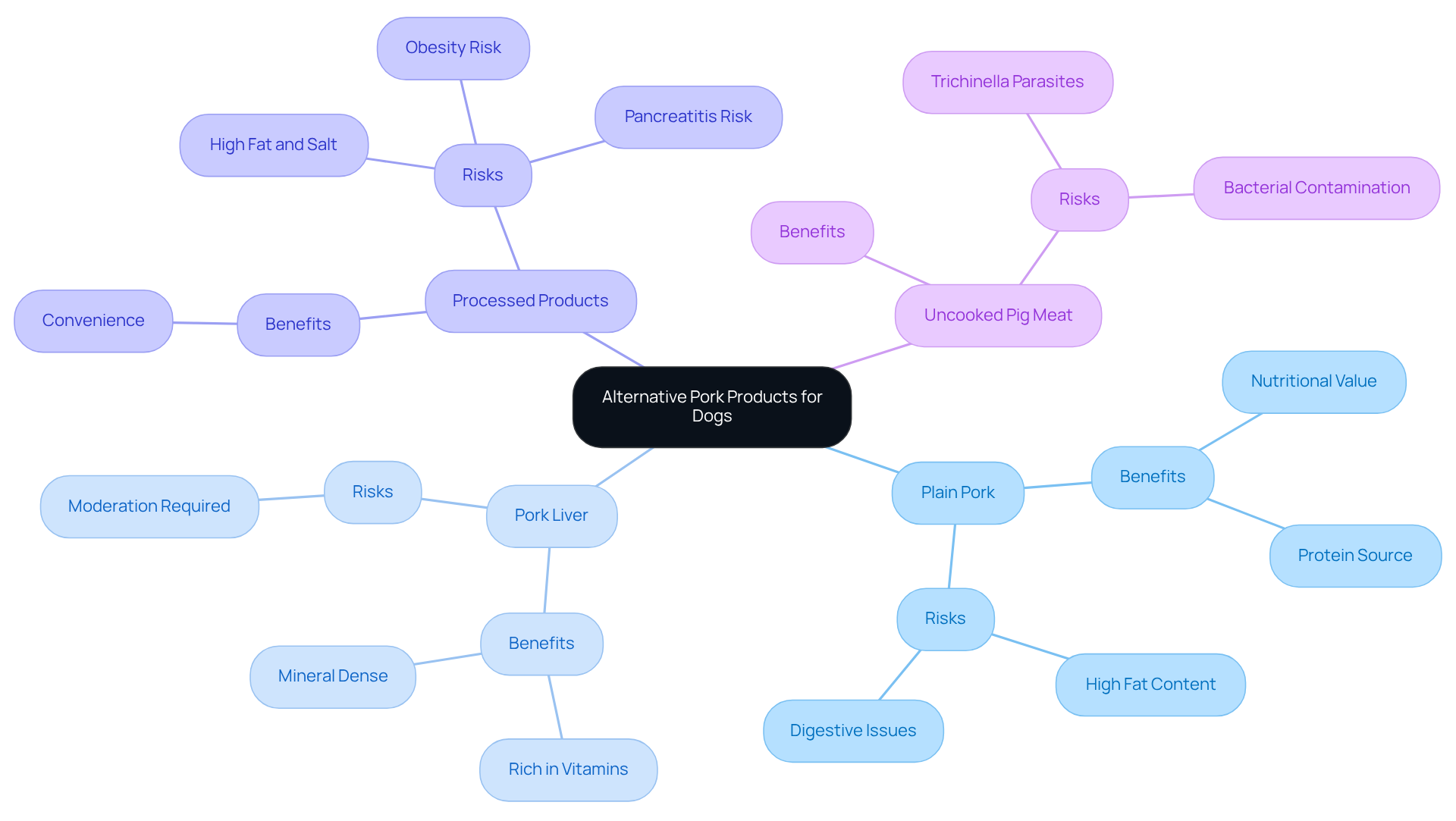
Understanding Pork Allergies: Signs and Considerations for Dogs
While pork can be a nutritious addition to your furry family member’s diet, it’s crucial to ask, is pork good for dogs, considering that some dogs may develop allergies to it. If your dog shows signs of a swine allergy, such as itching, gastrointestinal upset, or skin irritations, consulting your veterinarian is essential. They may suggest an elimination plan, which involves removing certain foods from your dog’s meals to see if symptoms improve, helping to identify the allergen.
When introducing any new food, including pork, it’s crucial to observe your dog carefully to determine if is pork good for dogs. Food allergies can arise unexpectedly, even after years of eating the same meals. According to veterinary insights, food allergies are relatively uncommon, affecting only about 0.2% of canines, but they can lead to significant discomfort if not managed properly.
For instance, dogs with food allergies often require dietary adjustments. Switching to novel protein sources or hydrolyzed diets can help alleviate symptoms and improve their quality of life. By being vigilant and proactive, you can ensure your dog’s dietary changes are safe and beneficial. Remember, your pet’s well-being is a priority, and with the right care, you can nurture a happy and healthy life for your beloved companion.
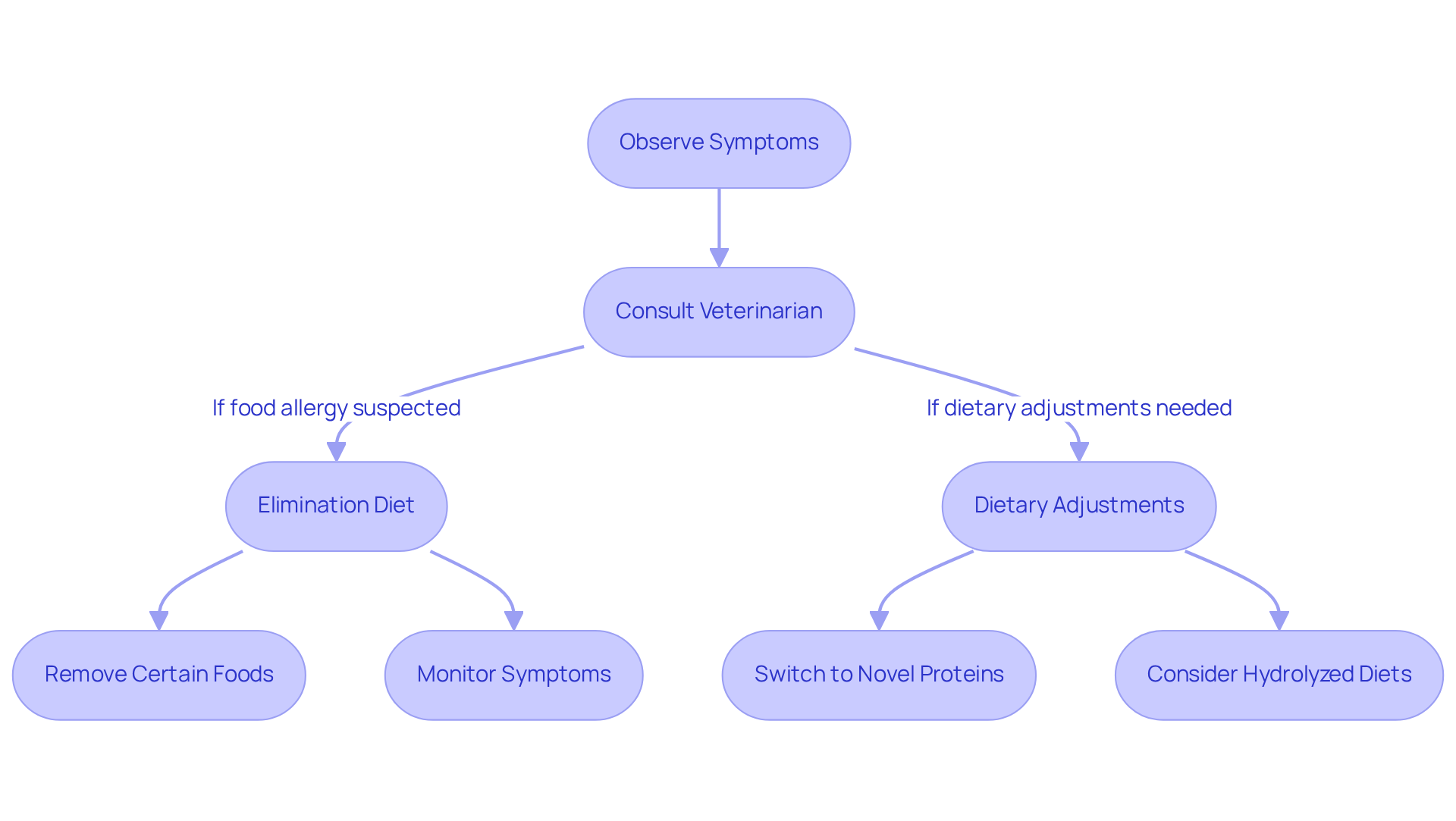
Incorporating Pork into Homemade Dog Food Recipes
Including meat in homemade dog food recipes can be a rewarding way to provide your furry family members with nutritious meals. Imagine a simple recipe that features ground meat, sweet potatoes, and green beans. By preparing the meat thoroughly to eliminate harmful bacteria and combining it with the vegetables, you can serve a complete meal that your dog will love.
It’s crucial to ensure that the recipe is balanced and fulfills your dog’s nutritional requirements. Many homemade meals can fall short in vital nutrients, as highlighted in recent studies. Exploring various ingredients can introduce delightful diversity in your dog’s meals while keeping meat as the main protein source.
However, it’s important to recognize the complexities involved in formulating balanced meals. Seeking professional guidance can help you avoid nutritional deficiencies and ensure your pet thrives. This approach not only enhances your dog’s nutrition but also empowers you to manage the quality of ingredients, guaranteeing a healthy and enjoyable meal for your beloved companion. Remember, you are creating a nurturing environment for your pet, and every thoughtful choice counts.
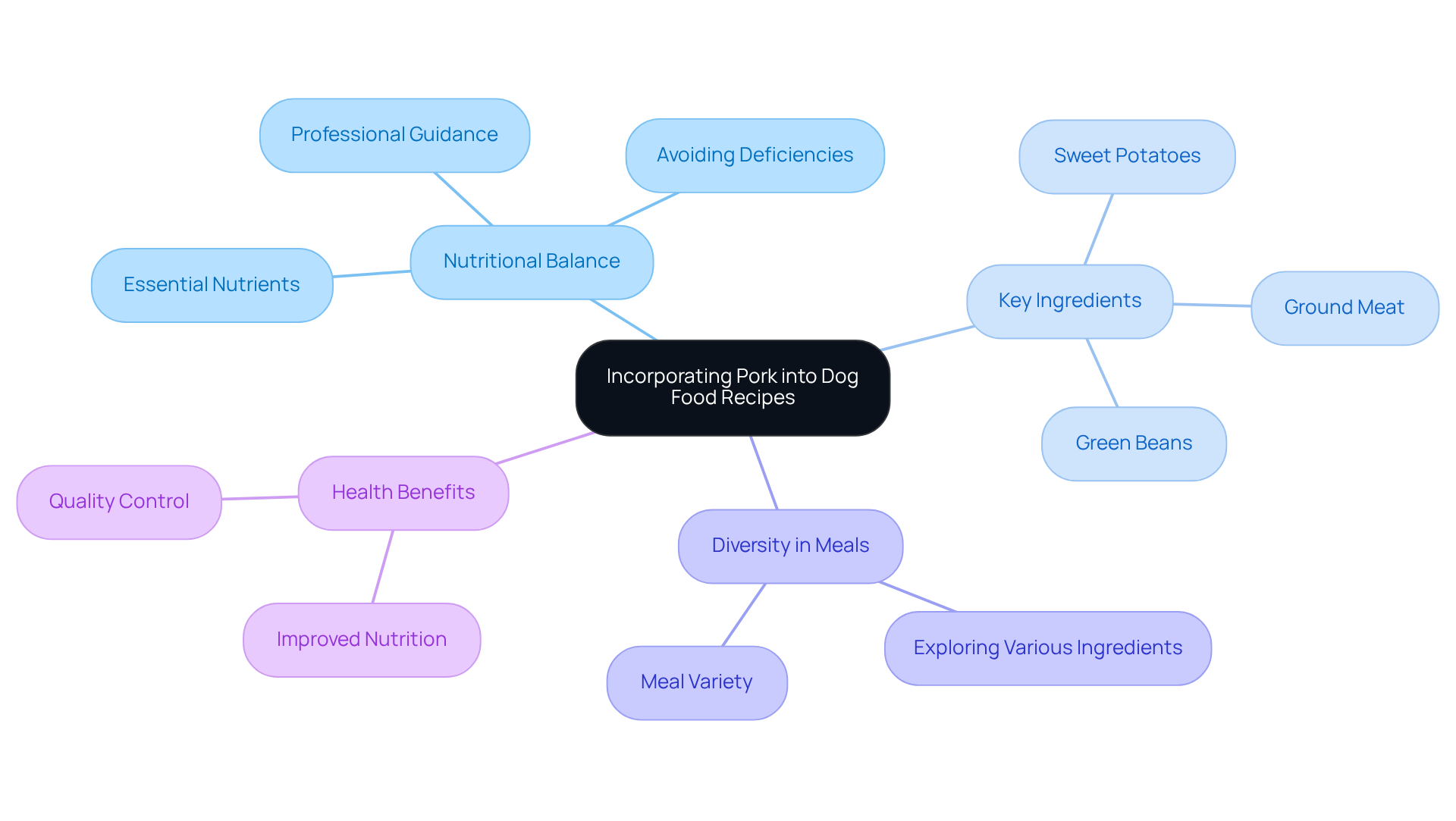
Consult Your Veterinarian: Ensuring Pork is Right for Your Dog
Before introducing pork or any new food to your furry family member’s meals, it’s essential to consult your veterinarian about whether pork is good for dogs. Your veterinarian can offer personalized advice tailored to your dog’s unique condition, age, and dietary needs. This guidance is especially important for dogs with prior medical issues or those on specific feeding plans. As Joseph Wakshlag, D.V.M., Ph.D., DACVIM (Nutrition), wisely notes, “It’s always a good idea to confirm your calculations with your veterinarian.” They will help determine the right portion sizes and frequency of pork in your dog’s meals, while also addressing whether pork is good for dogs to ensure a balanced and nutritious diet.
With approximately 60% of our beloved pets being overweight or obese, having tailored dietary guidance is crucial. This can significantly influence your dog’s overall health and well-being. Furthermore, making improper dietary choices can lead to serious medical risks, underscoring the importance of veterinary consultation. By taking this caring step, you are nurturing your pet’s health and happiness.
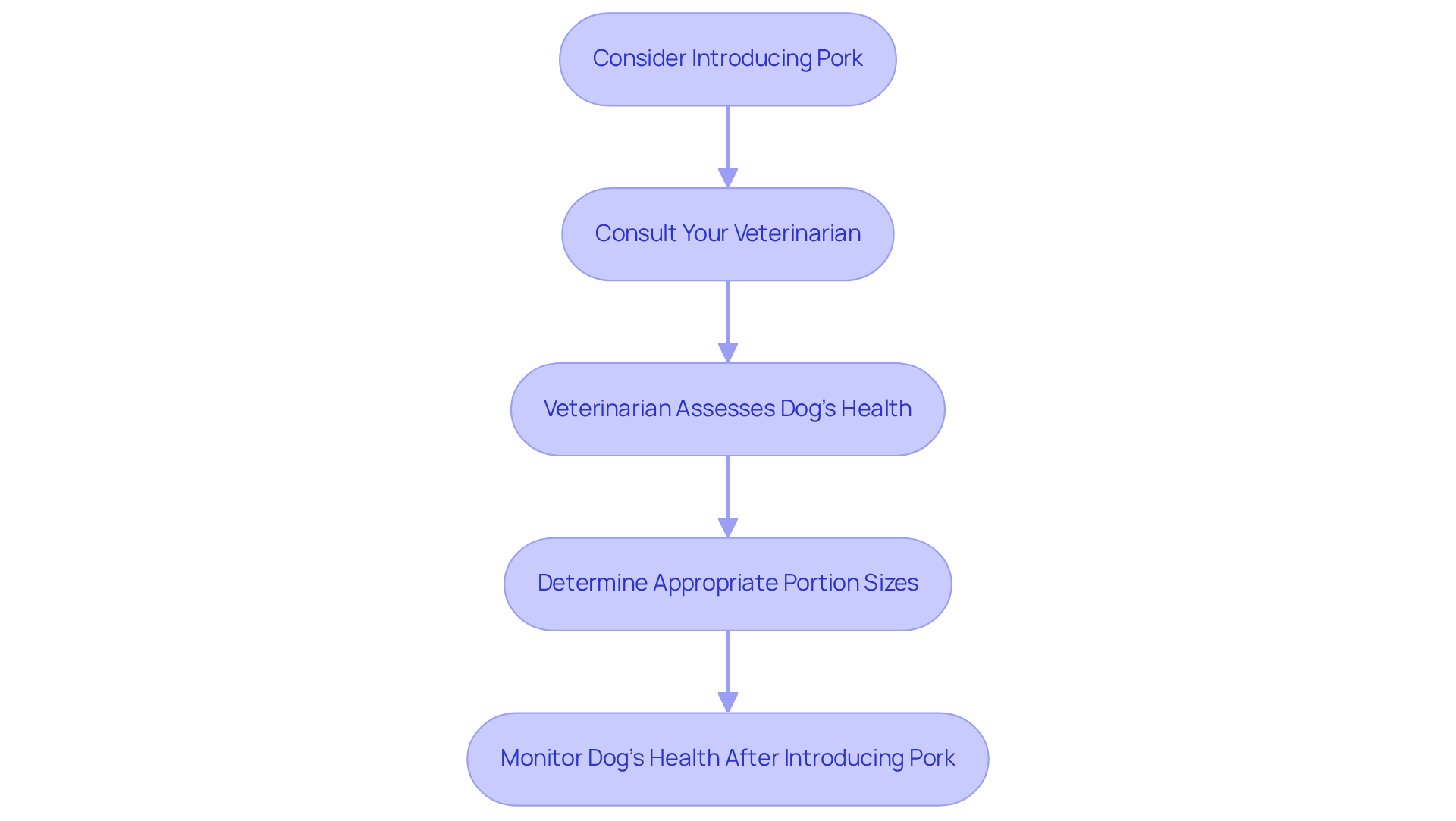
Conclusion: The Benefits of Pork in Your Dog’s Diet
Including meat in your dog’s diet can yield significant benefits, offering high-quality protein along with essential vitamins and minerals. When prepared properly—thoroughly cooked and unseasoned—it raises the question of whether is pork good for dogs, as it can serve as a nutritious addition that supports your furry family member’s overall well-being. For example, a 100-gram serving of cooked, ground meat contains approximately 7.7 grams of saturated fat and 9.3 grams of monounsaturated fat, making it a balanced source of fats. Pork is rich in thiamine, zinc, and B vitamins, which are crucial for energy metabolism and immune function.
Many pet owners are questioning if is pork good for dogs after effectively improving their pets’ meals with pork and observing enhancements in muscle condition and energy levels. Veterinarians frequently emphasize the benefits of incorporating this meat into a dog’s diet, often addressing the question of whether is pork good for dogs, citing its digestibility and nutrient density as key factors in promoting a balanced diet. However, it’s essential to be mindful of potential allergies and to introduce the meat gradually, monitoring for any adverse reactions.
To ensure a nurturing environment, portion sizes should be adjusted based on your dog’s size:
- Small dogs can receive 1-2 small pieces (30g)
- Medium dogs 2-3 medium pieces (60g)
- Large dogs 3-4 large pieces (90g)
Additionally, avoid feeding raw or undercooked swine and processed swine products. By adhering to safe feeding practices and consulting with a veterinarian to determine if is pork good for dogs, you can confidently enrich your furry companion’s meals with this nutritious protein source, contributing to their overall well-being.
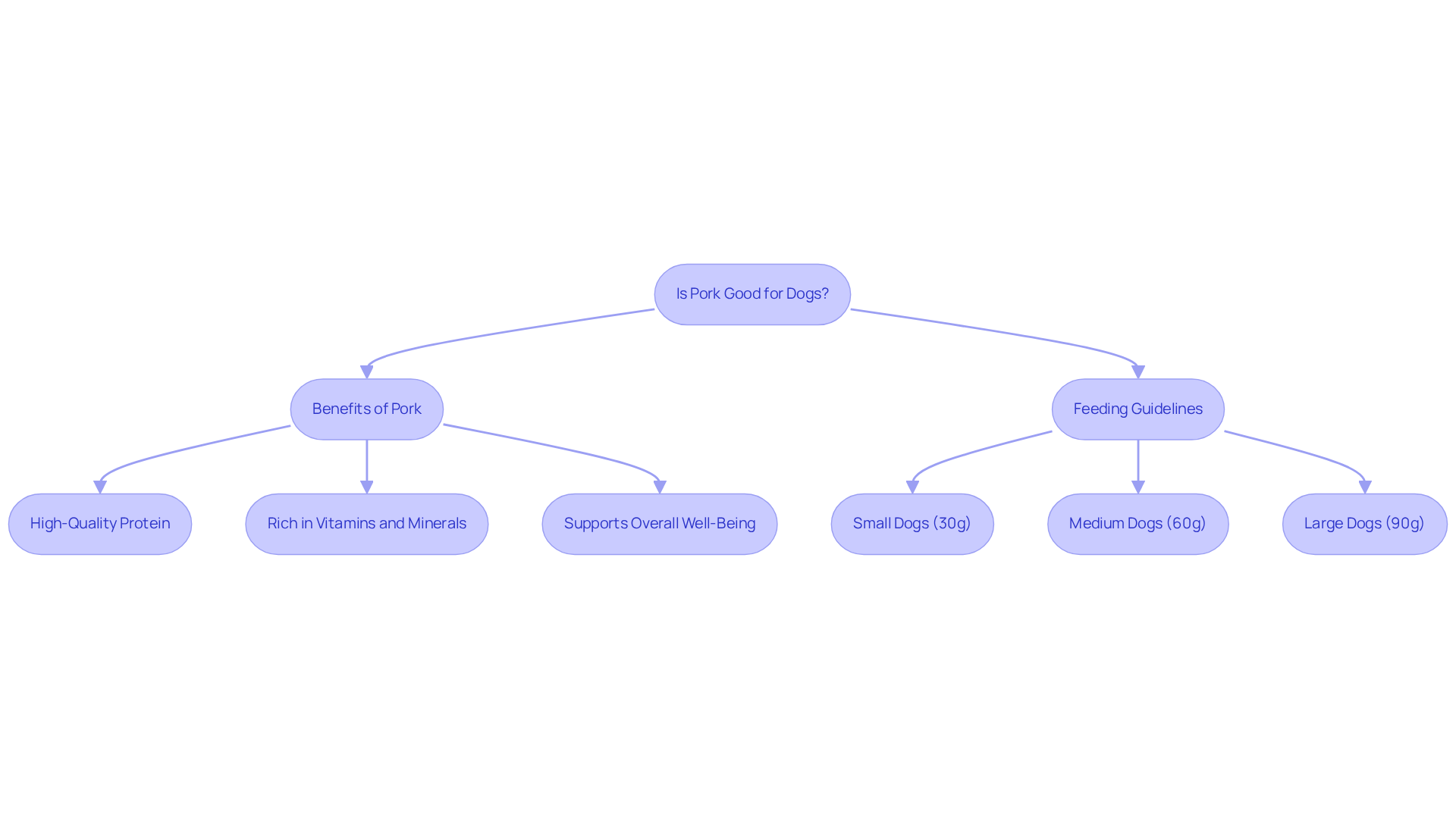
Conclusion
Including pork in your dog’s diet can be a valuable choice, offering high-quality protein along with essential vitamins and minerals that contribute to overall health. When prepared correctly—cooked thoroughly and served unseasoned—pork can enhance your furry family member’s meals, supporting muscle development and energy levels. This nutritious addition addresses the question of whether pork is good for dogs, highlighting its role in promoting a balanced diet.
The article emphasizes several key benefits of pork, such as:
- Its high digestibility
- Rich nutrient content
- Lower allergenic potential compared to other proteins
These factors make pork an excellent option for dogs, especially those with sensitive stomachs or food allergies. However, it is crucial to introduce pork gradually and monitor for any adverse reactions while adhering to safe feeding practices, such as avoiding raw or processed products.
Ultimately, incorporating pork into your dog’s diet can lead to improved vitality and well-being. By consulting with a veterinarian and following recommended portion sizes based on your dog’s size, pet owners can confidently enrich their dog’s meals with this protein source. Embracing these practices ensures a nurturing environment that supports the health and happiness of your beloved pets.
Frequently Asked Questions
What services does Adventure Den offer for pets?
Adventure Den offers dog daycare, dog boarding, and cat boarding services, all designed to cater to the unique needs of each pet.
How does Adventure Den ensure the safety and well-being of dogs?
Adventure Den ensures safety and well-being through mindful supervision by passionate staff, advanced security measures including 24/7 monitoring, and webcam access for pet owners to stay connected with their pets.
What is the significance of the outdoor play space at Adventure Den?
The outdoor play space at Adventure Den is the largest in the city, allowing pets to exercise, socialize, and explore freely, which is essential for their physical and mental well-being.
What are the benefits of personalized care in dog daycare facilities?
Personalized care in dog daycare facilities promotes socialization, training, and enrichment activities, which are vital for a dog’s overall well-being.
Is pork a good protein source for dogs?
Yes, pork is a high-quality protein source for dogs, providing a complete amino acid profile and being highly digestible, which is beneficial for dogs, especially those with sensitive stomachs.
What nutritional benefits does pork provide for dogs?
Pork is rich in B vitamins (B6 and B12), zinc, and selenium, which support energy metabolism, immune function, and overall vitality in dogs.
Are there any precautions to take when feeding pork to dogs?
Yes, it is important to prepare pork thoroughly, avoid seasonings, refrain from feeding fatty cuts, and never give cooked bones to dogs, as they can splinter and cause injuries.
Should I consult a veterinarian before adding pork to my dog’s diet?
Yes, it is highly recommended to consult with a veterinarian to ensure that adding pork to your dog’s diet is safe and appropriate.


